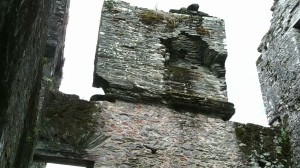Berry Pomeroy Castle takes its name from ‘Berry’ the local name for the area, and from the ‘de Pomeroy’ family name. The de Pomeroy family were of noble Norman birth, and were granted this land in South Devon as a reward, not long after they assisting their leader – William the Conqueror – invade Britain and defeat the English King Harold at the Battle of Hastings (in 1066 CE). William the Conqueror divided out the British land to his loyal subjects and supporters – all of whom occupied the upper echelons of Norman society The Normans were in fact Vikings or ‘Norsemen’ (i.e.’North Men’) who had invaded France (in the 9th century) and then settled in northwest area during the early 10th century CE. Their settlement was legally acknowledge by the French monarchy, and the Vikings began the process of merging their culture with that of the Gaelic French. After the Norman victory of 1066 CE in Britain, the warriors of the indigenous British kept-up a fierce resistance to the Norman presence for decades. The Normans spread-out across the land, and built very strong fortified houses and castles. These structures allowed the Norman occupiers to live in relative safety against the continuous threat of British attack. This castle building skill marked a significant evolution in the building of militarised structures in Britain, and there was very little the indigenous British warriors could do against the high and smooth stone walls, deep water-filled moats, and steep inclines. Even if British warriors could somehow penetrate the outer walls, they were confronted with virtually inaccessible inner walls, labyrinths of circular and confusing corridors, and many areas designed as ‘kill zones’ for Norman archers to unleash arrows on their attackers. Berry Pomeroy Castle was built relatively late, during the latter part of the 15th century – during the reign of Queen Elizabeth I. This castle is large and ornate, and the ruins are in very good condition. This Norman castle was probably more as a demonstration of wealth – rather than for any military or defensive purposes. By the latter 15th century, the Normans had settled into British life as the new upper class (or aristocracy) that ordinary British ignored or kept away from.






























